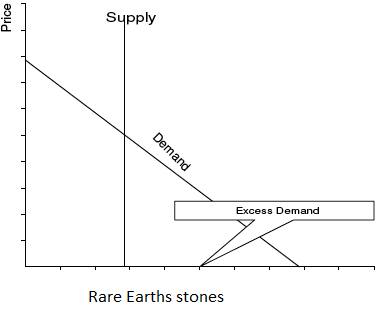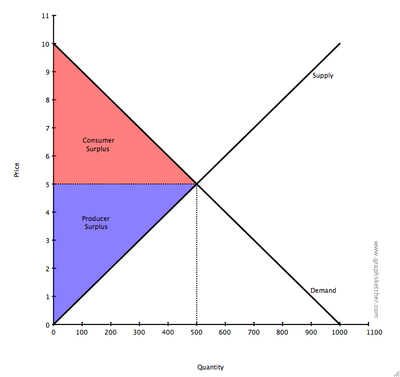Introduction
International trade is the trade that occurs between one country and other countries in the world. International trade is usually expected to be free. However, countries do come up with measures to restrict trade for various reasons. For this reasons, China has sought to restrict trade with Japan. China, who happen to be the largest producer of special earth’s stones has thought of enacting quotas and embargo of the selling of stones to Japan. Due to the policy of China, they already began restricting selling the stones some European countries. Due to the responsiveness of the price of the stones on demand, the prices of the rare stones have increased. Embargo of the special stones on Japan will lead to the worsening of international trade between Japan and China. This paper examines the economic impacts of restricting trade of rare stones between china and Japan in terns of price elasticity of demand, quotas and the consumer and producer surplus.
China embargo on special stones to Japan
The article is about the embargo that China is likely to implement on special earth’s stones to Japan. According to Hornby, it is still not official that China is implementing the embargo (para 3). The country is likely to implement the embargos basing in the arrest of Chinese trawler captain. Rare earth’s stones are group of some elements that include yttrium and lanthanum that are used in the enhancement of batteries, weapons and computers. The elements are mined together are then separated according to the element type and use. China is the largest world supplier of the rare earths stones with a 97% of the total supply of the stone throughout the world in 2009. Since the country enjoys the dominant supply of the stones, the enactment of quotas for a good part of 2010 led to the increase in the price of the stones. According to Hornby, the quotas on exports came unexpectedly and rapidly getting traders and users unawares and resulting in soaring prices of earth’s stones.
The argument of the Chinese government on the embargos of the stones to Japan is the Chinese government began sometimes back to exercise export quotas to Europe and the U.S and it is not Only Japan. Additionally, it has nothing to do with the boat incident. Since the Chinese government has denied enacting the quota system of the stones Japan, Experts argue that if ties continue to escalate, then China will enforce the quotas against Japan.
Analysis
The article is about implementing quotas and embargo of the supply of rare stones to Japan. These two measures restrict free trade between these two countries. Free international trade is the trade that occurs whenever countries carryout transactions without any restrictions. International trade occurs when countries exchange their products that they produce cheaply. Cheap production usually leads to a comparative advantage for a country. For instance, China mines rare stones cheaply and exports them to other countries throughout the world. The cheap extraction of the stones leads to a comparative advantage for China. Despite the comparative advantage, China destroys the free international trade agreement between countries by enacting the embargo and the quotas. Tariffs are the most common forms of trade restrictions. However, quotas and embargos are the worst forms of trade restrictions.
Quotas
Quotas are restrictions to international trade that are imposed on the goods produced and sold by a country. Quotas limit the good or services exported by a country into the international market. Additionally, quotas can take the form of limiting the quality of goods exported by a country under international trade. According to Skully, quotas are good trade restrictors than tariffs since they do allow any of the goods or services not allowed (1). This is applicable mostly when the domestic demand is not sensitive to the increases in the prices. Foreign currency depreciation or establishment of subsidies on quotas cannot offset the effects of quotas. Due to this, quotas have become a more disturbing trade restriction as compared to tariffs.
Tariff quotas are quotas that allow the importation of a certain quality of a given product either without any duties or at a certain level of duties. On the contrary, import quotas limits imports to zero. Under quota system, in cases where the imported product is less than would be when quotas are eliminated, the commodity price can be forced to increase domestically. The government can license the importers so that it captures the revenue while avoiding a lucrative source of profit that is private where private business exploits the consumers (Skully 2).

The diagram above can be used to show the quota system as implemented by China on the rare stones as agaist Japan. The quota can restrict the export of the stones to Japan to a certain quantity as indiocated by the vertival line (supply) in tehdiagram. As indicated in the diuaram, a steh quotas continouslsy rduces the quantityto be suplied by China, the price will increase and vice versa. This means that the price of the rare stones exclusively depends on the supply. As the demand increases an dteh supply declines, the price will continously incrraese.
Elasticity
Is the measure of the reactions of the demand of a good to a given commodity responds to the alterations in its price. It can be found by the division of the changes in percentage of the demanded good by the % changes in price. The calculated elasticity indicates the sensitivity of demand of a commodity to any changes to the commodity price. The price suppleness of demand that is higher shows the response rate that is higher for the demand of a good. On the contrary, a low elasticity of demand means that the demand of the product has a low sensitivity to the changes in prices. A unitary elasticity of demand indicates that a unit increase in price leads to the similar decrease in the demand of the product. The quota system enacted by China to the supply of rare stones leads to the increase in the increase in the price if the stones due to the sensitivity of the stones to the supply.
Consumer surplus and producer surplus
The forces of demand and supply usually result in the equilibrium of the price and quantity demanded of a commodity in the market. The forces of demand and supply for the rare stones can lead to equilibrium for the stones supplied and the price for the demanded stones. However, due to the implementation of the quota system, China will limit the supply of rare stones to not only Japan, but also other European countries. Due to the responsiveness of the price of rare stones to the supply, the price can increase. As China tries to sell the stones at a given price, it may end up receiving a higher price due to the quota. The excess amount of money that China may receive on the sale of are stones above the expected price is what is referred to as the producer surplus (Hajara para 2).

On the contrary, the surplus for the consumer is the extra amount of benefit that a consumer receives when the price that he / she actually pays for a product is less than what the consumer expected to pay. For instance, if china can lift the quota on rare stones and the price declines, the consumer willing to purchase the stones at a higher price may get a consumer surplus when China sells to the consumer the stones at a less price than the consumer was willing to purchase the stones. This is indicated in the figure above (Hajara para 3).
Embargo
An embargo is a worse instrument to trade than any other instrument for restricting trade. Embargos mean total ban to either exports of rare stones. The embargo of rare stones to Japan and other European countries will mean that the country cannot export any stone at whatever cost or other agreement. This is unlike quotas where China can implement the export tariff quotas based on tariff system. Embargoes would affect international trade between the two countries (Korkmaz 1).
Conclusion
Quotas are restrictions to trade that limit the export or importation of a given commodity to a certain quantity. Following to soaring relationship between China and Japan, China, which is the largest supplier of special earth’s rare stones has considered establishing quotas or even embargo on the amount of stones supplied to Japan. Any of the measures enacted by China will affect international trade between China and Japan. China can use tariff quotas to limit the amount of rare stones to be sold to Japan. Alternatively, the country can use embargos to restrict any type of trade in rare stones with Japan. The use of embargos will automatically mean that China will not sell any stones to Japan ant whatever cost. Due to the price elasticity of demand, the price of rare stones will change. However, after lifting the ban, china can realize producer surplus if it sells the stones to Japan at a higher price than they were willing to sell them.
Works Cited
Hajara, “Consumer Surplus and Producer Surplus,” 2010.
Hornby, Lucy. “China denies ban of rare earths exports to Japan.” 2010. International Business Times. Web.
Korkmaz, Haktanir. “Under The Shadow of the Embargo.” 2001. Web.
Skully, David. “Economics of Tariff-Rate Quota Administration.” 1893. Web.